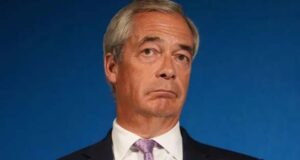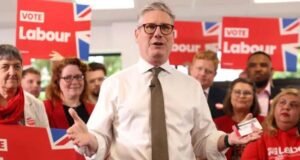
Bangla Mirror Desk : Rishi Sunak has called a surprise early election for 4 July in a contest that will see Keir Starmer try to take power for Labour after 14 years of Conservative-led government.
Mr. Sunak’s surprise announcement, from a rain-spattered lectern in front of 10 Downing Street, was the starting gun for six weeks of intense campaigning that will render a verdict on a party that has led Britain since Barack Obama was American president. But the Conservatives have discarded four prime ministers in eight years, lurching through the chaos of Brexit, the coronavirus pandemic and a cost-of-living crisis.
With the opposition Labour Party ahead in most polls by double digits for the last 18 months, a Conservative defeat has come to assume an air of inevitability. For all that, Mr. Sunak is calculating that Britain has had just enough good news in recent days — including glimmers of fresh economic growth and the lowest inflation rate in three years — that his party might be able to cling to power.
“Now is the moment for Britain to choose its future,” Mr. Sunak said as steady rainfall drenched his suit. “You must choose in this election who has that plan.”
Political analysts, opposition leaders and members of Mr. Sunak’s own party agree that the electoral mountain he must climb is Himalayan. Burdened by a recession, spiraling prices, a calamitous foray into trickle-down tax cuts, and serial scandals and malfeasance, the Tories have seemed exhausted and adrift in recent years, split by bitter internal feuds and fatalistic about their future.
“The Conservatives are facing a kind of extinction-level event,” said Matthew Goodwin, a professor of politics at the University of Kent who has advised Boris Johnson and other party leaders. “They look like they’re going to suffer an even bigger defeat than they did to Tony Blair in 1997.”
Other political analysts are more cautious: Some pointed out that in 1992, the Conservative government of Prime Minister John Major overcame a deep polling deficit to eke out a narrow victory and stay in power.
But since the party won by a landslide in the 2019 elections on the slogan “Get Brexit done,” the Tories have bled support among young people, traditional Conservative voters in England’s south and southwest and, crucially, working-class voters in the industrial Midlands and north of England, whose backing in 2019 were the key to then-Prime Minister Boris Johnson’s landmark victory.
Many are disillusioned by Mr. Johnson, who was forced out after scandals, including Downing Street parties that breached Covid lockdown rules, and even more so by his successor, Liz Truss, who was toppled after just 44 days, following proposed tax cuts that rattled financial markets, caused the pound to torpedo and fractured the party’s reputation for economic competence.
 Weekly Bangla Mirror | Bangla Mirror, Bangladeshi news in UK, bangla mirror news
Weekly Bangla Mirror | Bangla Mirror, Bangladeshi news in UK, bangla mirror news







